Podcast: Some Things To Pray for in March, April and May
Just a five-minute podcast with a few prayer requests for the coming weeks. 🙂
Podcast: Play in new window | Download
Just a five-minute podcast with a few prayer requests for the coming weeks. 🙂
Podcast: Play in new window | Download
We’ve recently started up a general Bible study for the church in Las Palmas. We had a packed house for the first lesson, and we had some fun with these little Bible posters…
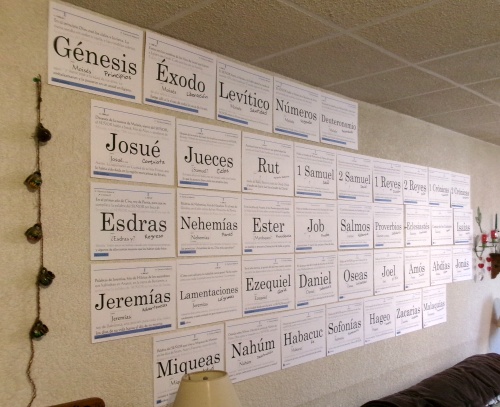
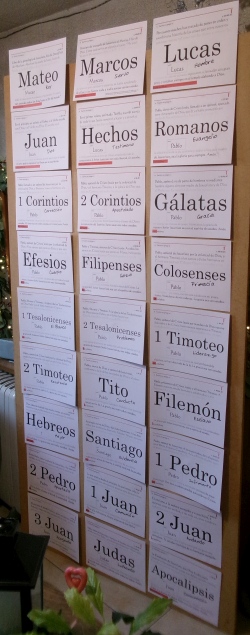
That’s the Old Testament above, and the New Testament to the right. Each poster has the name of the book, the language it is written in, the first and last words of the book, the estimated date, a keyword (theme), the author, and the length of the book (the thick line at the bottom), and sometimes a little more information. It’s fun to be able to see all this at a glance.
We originally used these posters for a special service at the church in Jesús María, and I had the books divided up into sections. But I didn’t really have the time (or space!) to do it this time.
Upon popular request I created a file with all the books together, so hopefully I’ll be able to use that at En la Biblia so that others can make use of them.
Our first two studies went well, with a lot of discussion about the sufficiency of Scripture, God’s involvement in His Creation, attacks on the Bible – we have an intelligent group which definitely tends to push the discussion to a deeper level!
We would appreciate your prayers for these studies, especially that more of the newer people at the church would join us.
Speaking of studying the Bible, I’m currently having my mind blown by John 5 as I prepare to preach on the healing of the man at the Pool of Bethesda, and Jesus’ subsequent teaching. Jesus certainly has a way of saying just the right thing in just the right way – please pray that He would be exalted as we continue our study of the Gospel of John!
As is the case, no doubt, with your own church, our church is facing many challenges from many directions. But God continues to teach and guide, and remind us that He is with us.
Thanks for your prayers!
Every once in a while in our Biblical Anthropology study, I found a particular book very helpful – and that’s the case here with Francis Schaeffer’s Art and the Bible.

Dr. Schaeffer, as you may know, was a pastor and writer from the USA. In this particular book, he suggests four ways to evaluate art, whether it be dance, theatre, music or painting.
I think we all know intuitively what he’s talking about here. Something done well, with technical excellence, is a great thing to see. It represents many hours of study or practice or rehearsal.
Do you see a man skillful in his work?
Proverbs 22:29
He will stand before kings;
he will not stand before obscure men.
Now, this doesn’t mean that we agree with the worldview behind the art. In fact, there may be technical excellence in something we would prefer not to see or listen to! But we can admit that it is well done.
For example, the original Star Wars movies present a very anti-Christian worldview. But they were done with excellence.
Is the artist being true to himself or herself, and his or her worldview? Or, for example, is it obvious that this was created just to make a profit? I think there are a lot of movies today that are obviously geared toward making money and little else. And this doesn’t tend to lead to a lasting quality.
Finally we come to the worldview behind the art. There is a worldview in architecture. There is a worldview in instrumental music. There is a worldview in the art that your government uses for their promotional materials. It may be that the artist isn’t even consciously aware of what is being communicated, or what this vision of the world is. But we all have one.
And, Dr. Schaeffer says, excellent art with an anti-Christian worldview can be terribly destructive in the culture. We need to judge it.
This is to say, you can have an ugly snake on a pole representing sin and suffering. You can have a majestic song to celebrate God’s glory. You may use different music, or different colours, for something sad or happy.
In other words, the form of the art should fit its message. You don’t want to create something that has a silly feel to it to talk about God’s judgement. A humourous cartoon mocking something who is suicidal would be offensive. There should be a harmony between medium and message.
Be sure to check out Dr. Schaeffer’s book – it’s not a long one: Art and the Bible
For a number of years my father (Robert Cottrill) taught a course called “Music in the Christian Life”, a course which he developed. In the course, he listed 12 principles for evaluating music – but I think the same principles could be used in any kind of art. These principles are summarized on his blog; I encourage you to check them out as another way to think about how we evaluate art: Music Choice: 12 Keys to Good Music
I’ll leave you with those points to ponder. Next time, as we conclude this section on creativity and communication, we’ll have a few questions to ponder by way of application, and we’ll look at a fascinating story from Jesus’ earthly ministry.
Our worship service on the 12th of February was kind of cool – because all three of us were involved! Yes, it happens sometimes.
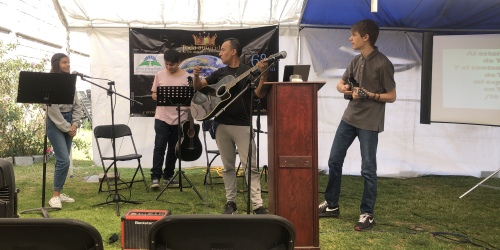
Shari was leading the kids’ teaching time, with a lesson about Jacob and Esau (Genesis 27:1-46; Romans 9:13). Nathanael grabbed his trusty ukulele and helped with the worship music. And I led the service.
We’re keeping busy, but there are a lot of other people working hard too! We’re still trying to get the “shade” just right, with some new mesh tarps. This Sunday will be attempt #3, but things are improving each week. It’s partly a matter of making things easier to set up, and partly a matter of covering what needs to be covered.
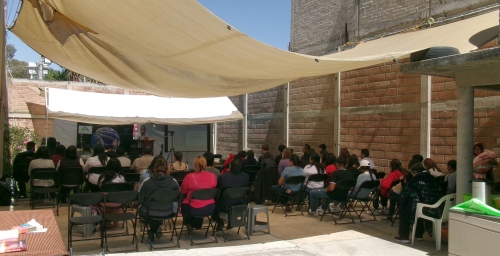
Last Sunday we had another practical problem, however – we ran out of chairs. Two men rushed out to get some stools so that everyone could sit down under our nice shade.
So… I’ll be buying some more this week. However, finding a place to store them all is becoming a problem. Good problems, but problems.
As God continues to work in our local church, the world, the flesh and the devil attack. So we would appreciate your prayers for people in our church who are struggling with health issues, family problems, and bereavement. It’s a challenging time.
We’re also looking forward to starting up a couple of Bible studies – a general one starting this Friday, and in the near future a new study for the women. Please do pray that people will come and that God’s Word will be applied to their hearts.
Thanks for your prayers!
We’ve been looking at some biblical principles for art – and in a wider sense, creativity and communication. These are good things created by God, that the world desires to twist to its own purposes.
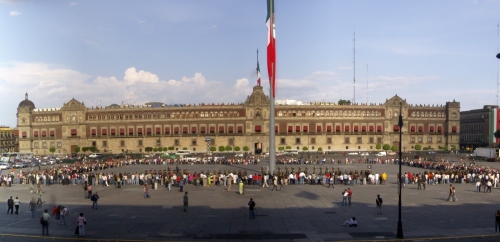
So, what does the world do? It takes what actually belongs to God – creativity and communication. It denies any dependence on Him. It changes their purpose. And it mixes truth with error.
The world wants to change the truth – hide it – suppress it (Romans 1:18).
And here, concepts like art, communication, technology and justice intersect. CGI technology. Deepfakes. Virtual reality. Social networks. Chatbots. The more we make our lives “digital”, the easier it becomes to lie to everyone. The easier it becomes to build a “world without God”, without any consequences for sin, an imaginary world. Built by human imagination.
We all must have a smartphone – or better, wearable technology. And today we talk about “the internet of things” – connecting more and more things to the network. Adding convenience, but also making everything easier to control from – elsewhere.
If the internet can be controlled, if art and communication can be controlled, it will be so much easier to control everyone.
We saw something fascinating happen over the past few years in many countries. Governments informed us that it was really no problem to have our religious services online. No worries. It was just fine to meet with our families online. Step one.
Step two. Invest heavily in technology. Make it so that more and more people can connect to high-speed internet. (Do a little digging and see what your government did – you might be surprised!).
And then, step three. Find ways to control what’s happening online. Technology, information — communication.
I could give some examples, but I’ll let you check them out for yourselves.
Back in 2021, when I was first working on this topic, all of the news feeds were exploding with the story of Frances Haugen, a former Facebook manager. She was expressing her concerns, certainly some valid concerns, about Facebook and Instagram.
What was fascinating about this was the solutions that the headlines proposed. Here’s one from Mexico (La Jornada) (my translation): Facebook Whistleblower Calls for Regulation of the Company before the US Senate
Another one – EI Universal: Facebook Whistleblower calls on US Lawmakers to Regulate the Social Media Giant
How about the CBC? Ottawa urged to crack down on Facebook after bombshell whistleblower testimony before U.S. Senate
What’s the solution “everyone” is all of a sudden pushing for? To go to “the Lord the Government” and ask them to take control.
It’s not surprising that if people with an unbiblical worldview want to take control of creativity and communication, injustice and lies will follow. Truth will be mixed with error, and God’s truth will be ignored (suppressed). What truth? The truth about the world in general, the truth about judgement, truth about salvation, truth about Christ.
In the USA, President Biden did something in 2021 that had never been done in the history of the country. Something that you probably wouldn’t guess.
There is a commission that is in charge of the design of official buildings in the capital. Upon becoming president, Mr. Biden got rid of more than half of the people on the commission and replaced them. Unheard of! Why was this such a huge priority? Because – a revolution in the culture requires a revolution in its art. In this case, in architecture.
For example, there has been a movement in architecture to make buildings look “anti-natural” – in some cases, even intentionally ugly. And so you have a structure which essentially says, “There is no order in this world. There is no God.” And then, of course, you have engineers who must use God’s order to make sure that the building doesn’t collapse!
You see, architecture has a purpose. It has its own message. In Mexico, we have the National Palace, for example. It’s both a symbol of government and a functional place where business is conducted. It was originally built in 1711, and hasn’t changed much since the Independence. It uses European elements, showing the connection between Mexico and Spain. It’s built on land used by Moctezuma II and Hernán Cortés, showing a continuity of power.
It also uses a style known as “baroque”. This style emerged from Roman Catholicism in Italy, as a way to fight against the Protestant Reformation. It was a new and awe-inspiring style. And so even Roman Catholicism is represented in the National Palace. And we could go on and on. Art has a purpose.
But let’s not make it sound like art is like a functional machine – one of the “purposes” of art is to be simply enjoyed. We enjoy beauty, because beauty is from God, and glorifies Him. Enjoying the beauty of Creation is part of its noble purpose.
But remember this: Art, like anything else, is under the Lordship of Jesus Christ.
We’ve talked a little about purpose, truth and dependence in creativity and communication. Next time we’ll talk specifically about how we can evaluate or judge art.
We know intuitively that art, in some way, can be used for “good” or “bad”. And it seems to us that there is “good art” and “bad art”. But of course many today would tell us that you simply cannot judge art, because it’s art! After all, artists should have absolute liberty to be creative.
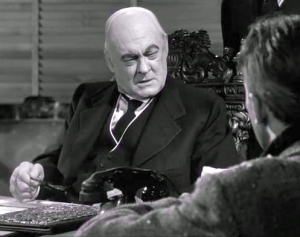
So today in our Biblical Anthropology series, we ask the question – can you judge or evaluate art? Or is it only a question of culture, or opinion?
Let’s go to a very important text in the book of Colossians. The Apostle Paul has been talking about Jesus Christ as the Creator and Sustainer of the universe. In Christ “are hidden all the treasures of wisdom and knowledge” (verse 3).
Now, he’s going after the false teachers, who want to bring back the feasts and dietary laws from Moses.
See to it that no one takes you captive by philosophy and empty deceit, according to human tradition, according to the elemental spirits of the world, and not according to Christ. For in him the whole fullness of deity dwells bodily, and you have been filled in him, who is the head of all rule and authority.
Colossians 2:8-10
“[Christ] is the head of all rule and authority”. Jesus said it this way in John 5:22 – “the Father … has given all judgement to the Son”.
Everything in all of creation is under the authority of Jesus Christ. Science, art, math, governments, churches, your workplace, your video games, your playlist. Everything.
We recognize that people have different preferences, and that’s fine. But everything is still under Christ’s authority.
We’re constantly creating art, our community is constantly creating art. And every movie, every band, every painting, every meme, must be placed under the authority of Christ.
This isn’t to say that every song should be a Christian hymn, and that every painting should represent a Bible story. But it does mean that all art must be for God’s glory. And even secular (non-religious) art can glorify the Lord. Even art created by unbelievers can glorify God, thanks to God’s grace in all the world, and the imago dei.
But let’s get real – very often the world is using art to actively fight against God. So we need to think about how that is done.
Let’s go back to where we started in our first study – Genesis 1 & 2. We looked at three keywords in that study – Truth, Dependence, and Purpose.
Yes, art does have a purpose. Even when it is supposedly simply “art for the sake of art”. Or when it’s deliberately “purposeless” art. But of course, that is its purpose. You simply can’t avoid purpose.
Dependence? We depend on something that is outside of ourselves, and all things depend on God. Or, we could say, they depend on Christ – “in him all things hold together” Colossians 1:17.
So let’s look again at what happened with “Nehushtan”, the bronze snake.
First, the people had to pretend that they didn’t depend on God. The image was controlled by unbelievers who used it as a false god. I mean, imagine if the image had been placed in a museum with a notice underneath: “Praise Yahweh for saving us from judgement – read the fourth Book of Moses for details”. Maybe the idolatry never would have happened!
The purpose of the bronze snake was changed. Instead of a reminder of God’s judgement, and a symbol of faith, it became a false god in itself.
And truth itself had to be ignored. “This isn’t just a metal image on a pole – it’s the mighty Nehushtan!” And perhaps the story of Numbers 21 was told, conveniently leaving out some important details, such as the sin of the people against God. Truth mixed with error. We’ve talked about that before – remember the house in ruins?
Finally, they separated the image and the Word of God completely. They tried to reinterpret the world, ignoring God’s revelation, God’s truth. “…men, who by their unrighteousness suppress the truth” Romans 1:18.
Claiming to be wise, they became fools, and exchanged the glory of the immortal God for images resembling mortal man and birds and animals and creeping things.
Romans 1:22-23
The world used its God-given creativity and ability to communicate to attempt to change the truth. Of course, you can’t change truth. But they hid it, suppressed it. How?
Have you ever noticed that when you see “popular sins” depicted on the big screen, there are rarely serious consequences? Immorality, for example, rarely results in disease and broken families.
And when you see a pastor or other Christian religious figure, usually they’re ignorant – or even evil? But if there’s an immoral person, that is, immoral in a culturally acceptable way, that person is often depicted as being very wise, or at least they’re the comic relief.
In Hollywood, especially in the 1930s-1950s, movies were regularly evaluated to determine if they were “decent”, and they were censored if they didn’t comply with certain criteria. For example, the 1946 movie “It’s a Wonderful Life”. One of my favourites, I’ll admit it.
If you don’t know the movie, it’s a fantasy about a man wanting to commit suicide, who is visited by an angel.
The movie almost had to be changed. Why? Well, in the story there’s a rich and evil man named Mr. Potter. Now, Potter is a wicked man, who is depicted as a wicked man in the movie. So far so good. Already we’re doing better than most of today’s movies.
But in this movie, he never experiences any significant consequences for his sin. There’s no punishment at the end. Of course, that’s the way things sometimes are in the real world – evil people seem to get away with their evil. But for some people, that made the movie “indecent”. My, how things have changed!
Today, it seems, movies must make evil look good.
Next time we’ll look at some current examples of how creativity and communication are being used by the world.